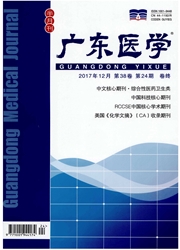

 中文摘要:
中文摘要:
目的 调查中山市小榄地区地中海贫血产前筛查中夫妻双方β-地中海贫血(简称β-地贫)的基因突变类型、分布特征及产前诊断情况。方法 采用血常规结合血红蛋白电泳法对孕妇血样进行地中海贫血产前筛查,对筛查阳性的疑似地贫携带者,采用单管多重跨越断裂点PCR技术和PCR-寡核苷酸探针反向斑点杂交法(PCR-RDB)进行地贫基因检测,地贫基因检测阳性者,则要求召回配偶。如果夫妻双方同时携带β-地贫基因,则建议其做产前诊断。结果 产前地中海贫血筛查孕妇22 220名,5 560例地贫血液学表型筛查为阳性,进行地贫基因检测后发现2 621例诊断阳性,其中携带β-地贫基因突变的1 065例,含β复合α地贫突变的138例。有1 164名配偶接受召回进行地贫基因诊断,204例诊断阳性,其中携带β-地贫基因的80例,含β复合α地贫突变的11例。所有个体共检出12种β-地贫基因突变类型,构成比靠前的为CD41-42(-TCTT)突变,分别占48.75%(39/80,男方)和44.41%(473/1 065,女方);其次为CD17(A→T)突变,分别占15.00%(12/80,男方)和19.72%(210/1 065,女方)。夫妻双方为β地贫基因携带者的22对,20对进行产前诊断,9对夫妻的胎儿诊断为重型β地贫;另有2对拒绝产前诊断,随访发现其中1对夫妻生出重型β地贫患儿。结论 小榄地区常居人群β-地贫基因携带率较高,地贫产前筛查及产前诊断依从性较差,应加强婚育人群地贫防控相关知识教育,确保所有婚育人群了解重型地贫的危害性及严重性,对开展地贫群体干预和促进优生优育具有重要意义。
 英文摘要:
英文摘要:
Objective To analyze the β- thalassemia spectrum in Xiaolan area in Zhongshan by investigating the genotype of pregnant women and their spouses in the process of prenatal screening and diagnosis. Methods General hematologic detection and hemoglobin electrophoresis for thalassemia was carried out on peripheral venous blood samples of all prenatal women in our hospital. The husband was called back if his wife showed positive result in phenotype screening. Molecular diagnosis towards thalassemia mutations was performed by Gap - PCR and PCR - RDB techniques. If both wife and husband carry the β - thalassemia mutation, prenatal diagnosis was performed. Results 22 220 pregnant women were analyzed. 5 560 women showed positive results in phenotype screening, and 2621 women carried thalassemia mutations confirmed by molecular diagnosis. 1 065 women carried β- thalassemia mutations and 138 of them were compound heterozygote of 13 and ctthalassemia. 1 164 husbands were called back for molecular diagnosis and 204 husbands carried thalassemia mutations. 80 husbands carried β - thalassemia mutations and 11 of them were compound heterozygote of β and ctthalassemia. 12 β - thalassemia mutations were detected. The common mutations include CD41 - 42 ( - TCTT) ( accounting for 48.75% in men and 44. 41% in women) and CD17 (A→T) ( accounting for 15% in men and 19. 72% in women). 22 couples were both carriers of β - thalassemia genes. Prenatal diagnosis was conducted in 20 couples and 9 fetuses were diagnosed to be thalassemia major. 2 couples rejected prenatal diagnosis and one of them gave birth to a thalassemia major baby. Conclusion Carriers of β - thalassemia gene is quite common in Zhongshan, but compliance to prenatal screening and diagnosis of β -thalassemia is poor. Effective prenatal screening plus prenatal diagnosis is important to prevent thalassemia and improve the population quality.
 同期刊论文项目
同期刊论文项目
 同项目期刊论文
同项目期刊论文
 期刊信息
期刊信息
